 |
MAGAZINES
|
 |
 |
Profiles of August 1998 Issues
Interzone August 1998
Mary Doria Russell is interviewed. She wrote two SF novels, beginning with The Sparrow, because the only way to handle the theme was through SF; but her next book is set in Genoa during the Nazi Occupation. ''I'm so glad you're not going to turn out to be a science-fiction writer'', her editor said.
•
Film reviewer Nick Lowe finds Deep Impact dismal but Dark City is ''the best thing this year''.
•
Gary Westfahl cautions us against worrying excessively about asteroids falling from the sky.
•
Book reviewer Chris Gilmore compares Carolyn Ives Gilman's Halfway Human favorably to Le Guin, while Brian Stableford considers the supermarket of approaches to alternate histories in novels by Card, Keyes, and Wilson.
•
Terry Pratchett reviewer Roy Gray reports on the stage version of ''Guards! Guards!''.
•
In fiction, Alastair Reynolds sets a Larry Niven-esque hard SF puzzle in the context of an interplanetary gaming rivalry, Michael Bishop imagines an alternate fate of a fisherman who did not die on the cross, Cherry Wilder creates an amber room in a near future Europe nervous about the effects of genetically engineered substances, and new writer Alexander Glass loses a far future space probe.
(Short fiction reviews)
(Sat 26 Sep 98)
|
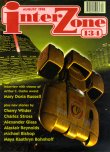 |
Odyssey Issue 4
David Langford's ''Critical Mass'' column recounts the deficiencies of the CD-ROM versions of Clute and Nicholls' Encyclopedia of Science Fiction [while modestly avoiding mention of his own much-improved viewer software for the Grolier version -- see Langford's Ansible website for information].
•
Ben Jeapes describes Stephen Briggs' adaptation into stage plays of several of Terry Pratchett's Discworld novels.
•
Roz Kaveney's ''State of the Arts'' column deals with the difficulty of deciding how people in Fantasyland talk -- and finicky readers who have firm ideas on the subject.
•
Jeff Hecht's science column considers the greenhouse effect and ways to combat it (coincidentally with Greg Benford's F&SF columns on the same subject).
•
Colin Greenland offers advice to writers.
•
In fiction, Ian Watson manifests a famous French detective aboard a starship where two murders have taken place, and Vonda N. McIntyre offers a daft vignette about hunters pursuing an unexpected quarry.
(Short fiction reviews)
(Tue 15 Sep 98)
|
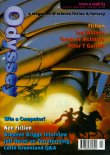 |

|
Event Horizon August 1998
Ellen Datlow and company's new webzine debuts
•
Pat Cadigan's fiction about the historical dramatization of the career of a Latin singing group is a sly examination of the pitfalls of using memory as communications technology.
•
Barry N. Malzberg's commentary ''From the Heart's Basement'' bemoans the loss of science fiction's history: ''[T]he field of speculative fiction [is] wholly atomized. No more center, no common language, no shared history or lexicon. Once, single-track convention
programming and paperback publishing programs of four titles a
month had created a concentration of dialogue, reference, and
understanding; now Star Trek and Star Wars and the Internet,
costume fandom and masquerade fandom and weapons fandom
have all become symptomatology of a field which has been blown
apart.''
•
Collaborative fiction, weekly chats, and a Question of the Week will appear shortly.
(Short fiction reviews)
(Sun 16 Aug 98)
|
Asimov's August 1998
A Greg Egan novella examines faith on a far-future water world whose settlers have diverged both religiously and sexually from their human ancestors.
•
A moving Robert Reed story considers justice in the aftermath of a defeated alien invasion.
•
Gardner Dozois and Michael Swanwick contribute an unusual SFnal horror story, Stephen Baxter discovers that Dante understood secrets of modern cosmology, and James Patrick Kelly finds proof for God and the afterlife.
•
Robert Silverberg confesses a childhood sin: he killed frogs for sport.
•
James Patrick Kelly surfs the net, comparing search engines by typing ''science fiction'' and seeing what sites come up first.
•
Paul Di Filippo reviews a vast range of books, with special attention to small presses and the novels of Patrick McGrath.
•
(Short fiction reviews)
(Fri 14 Aug 98)
|
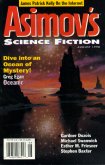 |
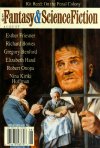 |
F&SF August 1998
An issue full of lots of shorter than usual stories, 10 in all.
•
Kit Reed offers a sardonic look at an historical theme park that doubles as a prison.
•
Robert Onopa satirizes the death industry in a novelet with a subplot about a comet heading straight for Earth.
•
New Canadian writer Jan Lars Jensen sets a powerful drama on a Pacific island during the war with Japan.
•
Other stories are by Richard Paul Russo, about a hunted man with no memory; Mark Budz, about a boy and his grandfather and flowers on the moon; Richard Bowes, about a huntress in New York; and Esther M. Friesner, about a skeleton and quiet New England street.
•
Gregory Benford's science column is the first of three about his participation in the design of a Voyager-like message for the Saturn-bound Cassini spacecraft. The medium: a diamond disk 2.8 cm across and 1 mm thick.
•
Reviews by four hands include editor Van Gelder's take on Thomas Disch's book (thumbs up) and William Tenn's recollection of a fascinating and disgusting 1934 novel by Tiffany Thayer.
•
(Short fiction reviews)
(Fri 14 Aug 98)
|
Analog July/August 1998
Real-life space exploration: Geoffrey A. Landis describes his participation in last summer's Pathfinder mission to Mars. Landis helped plan the mission, designed one of the experiments (a dust deposition monitor), named some rocks -- ''Yogi'' and ''Twin Peaks'' -- and lived on 'Mars time', with schedules slipping 40 minutes a day to stay in synch with Martian sunrise. Then he got in hot water when his camera sequence accidentally pointed the camera at the sun.
•
James Gunn sneak-previews his forthcoming The Road to Science Fiction #6: Around the World with an essay explaining the different traditions of American and European SF, and two brief stories, one by a Czech writer, the other by a German.
•
G. David Nordley takes a spacecraft from the Moon to Mars in a single day, while Bud Sparhawk sends an adolescent boy on a rescue mission across the shaky ice of Europa.
•
Stephen Baxter forges connections between a retired Apollo astronaut, a chapel in a Welsh village, and Chinese history. And Daniel Hatch drowns New York as the world's icecaps melt and slip.
•
Eliot Fintushel writes a sonnet about neurotransmitters.
•
(Short fiction reviews)
(Wed 22 Jul 98)
|
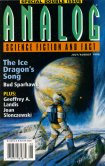 |
|
 |



